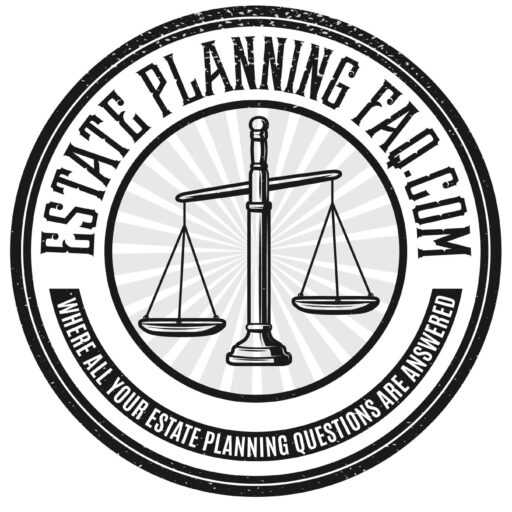Last Updated on October 26, 2022 by Estate Planning FAQ

Introduction
A rather simple question but is difficult to explain in short form. In its simplest description, estate planning is the process where an individual (testator) determines how his/her property will be transferred at his/her death. This includes not only who should receive it but what assets will be transferred. The manner as to how this is completed and the instruments used can be very simple to very complex and should be unique to each person.
In addition to transferring property at death and to whom, estate planning also includes planning for those instances when a person is no longer able to take care of themselves. This can be due to a physical disability or mental disability. Typically this term is referred to as “disabled or incapacitated” but may vary depending on the state where the individual resides. It is important to plan for this possibility as well.
This post will try and explain: (i) frequent terms used in estate planning; (ii) a general description of the documents used in estate planning; and (iii) finally a description of some of the simpler methods of estate planning and concluding with some of the more elaborate methods that are available. In subsequent posts, this blog will address in general question and answer form many of the areas referenced herein.
Frequent Terms Used in Estate Planning
To assist in understanding the remainder of this blog along with other blogs, not only on this website but also on the internet regarding estate planning, a brief definition of some of the terms used is necessary. Some of the terms commonly used when discussing estate planning include:
- Grantor/Settlor/Testator – the person who creates the estate plan. Depending on the type of plan chosen, a different label is given but each basically refers to the person creating the plan.
- Decedent – the person who has passed away. Previously the grantor/settlor/testator before their death.
- Beneficiary (Designation) – the person named on accounts, life insurance, retirement accounts, investment accounts, etc. that is to receive the property at the death of the decedent. Beneficiary designation avoids probate.
- Jurisdiction – the term typically used in referring to the State where any court proceedings will be held. It also refers in general terms to the State whose laws will be referenced and applied to any question regarding estate planning.
- Estate – the term used to refer to all of the assets (real or personal) owned by the decedent at the time of his/her death.
- Heir – the term used to refer to those individuals that would receive the estate of the decedent under the laws of intestate succession in that particular jurisdiction. A person’s heirs are not determined until the death of that individual.
- Devisee/Legatee – the term used to identify the beneficiary who receives property under the terms of a Last Will and Testament. A devisee is commonly referred to those person(s) that receives the real property of the decedent. a Legatee receives the personal property of the decedent.
- Probate – the judicial process of determining what property the decedent owned at the time of his death that did not have a beneficiary and the judicial process of who is to receive the property of the decedent and the oversight of the administration of the process.
- Executor – the term used to describe the person or organization who is to be in charge handling and administering the decedent’s estate and who is named under the terms of the Last Will and Testament of the decedent. An executor is appointed only after the Last Will and Testament has been admitted to probate.
- Administrator – sometimes considered and interchangeably with Executor. This also is the person who administers the estate of the decedent. An administrator is the term used to describe the personal representative of an estate when the decedent did not have a valid Last Will and Testament. An administrator is appointed only after a probate case has been opened with the court. There may be some jurisdictions that only uses this term but in general it is referring to the person in charge of handling an estate.
- Personal Representative – The person appointed by a court to assist in the administration of the decedent’s estate. It is a term typically used to describe in general the person to administer the estate and includes both the person appointed under the terms of the Last Will and Testament along with a person appointed when the decedent did not have a Last Will and Testament.
- POD – Payable on Death – a designation similar to a beneficiary designation on an account. It is a term used depending on the type of account. For example, bank accounts (checking/savings, certificates of deposit) allow for a payable on death designation.
- TOD – Transfer on Death – a designation similar to a beneficiary designation. It is a term used depending on the type of account. Some investment accounts use the term “transfer on death” as do titles to vehicles and real estate deeds.
- Testamentary/Non-Testamentary Disposition – The two methods of how assets owned by the decedent are passed at the time of death. Testamentary refers to the process of passing property through court proceedings. Non-testamentary refers to the process of passing property of the decedent to those individuals listed in each of the documents or beneficiary designation and does not require involvement by the Court to transfer.
- Agent – the term used for the person to act un a Power of Attorney. Either healthcare or financial. The person is designated to take action on behalf of the Principal.
- Principal – the term used for the person that grants authority and permission to the Agent to act on their behalf in the event they are not able to.
Documents Commonly Used In Estate Planning
In general, the documents that are referred to when a person refers to their estate plan includes:
- Last Will and Testament
- Durable Power of Attorney for Financial Decisions
- Durable Power of Attorney for Healthcare Decisions
- Living Will (Declaration of Natural Death)
- Revocable or Living Trust
This is not intended to be an exhaustive list. There may be some jurisdictions that includes or removes some of the above named documents as part of a general estate plan. It is the author’s experience that the above documents are the most common when referring to an estate plan.
Estate Planning Does Not Require Elaborate Documents
There is no set or standard estate plan but each plan should take into consideration and be established to meet the desires of the individual. Although the documents used may be typical and are those referenced above, each of the documents are prepared to carry out the specific wishes of the decedent. Some examples of the wishes that the decedent may have could include preventing the beneficiary from receiving the funds until they reach a certain age; certain milestones or accomplishments before they may receive the funds; exclusion of certain family members, etc.
Depending on the desires of the decedent, certain estate planning documents are a better fit. Consultation with an experienced estate planning attorney can determine which documents should be used.
Failure to Prepare your Estate Plan Could Have Undesired Results
Not doing anything regarding your property is a form of estate planning. However, by not doing anything, the state where the grantor/settlor lived at the time of their passing has an estate plan for them, they just are not aware of it. Typically this will involve significant expense and involvement with the court in a probate matter. Depending on the value of the estate and the state where the decedent died, there may be an abbreviated procedure that can be used if the estate is under a certain dollar amount. However, it would be safe to assume that the the estate will incur significant more expense if the decedent has no estate plan over an even very simple estate plan that uses only beneficiary designations.
In addition to having unforeseen consequences after the grantor/settlor dies, during their lifetime, failure to plan for their disability or incapacity could result in court intervention to appoint a guardian and/or conservator. This is sometimes a time intensive and expensive process whereby the Court determines who will be allowed to make decisions for the disabled and incapacitated person. It may not be the person that the grantor/settlor would have chosen.
It is the hope that this blog provides the reader with an overview of the state process. It is strongly suggested that the reader consult with a professional in his/her state or jurisdiction if they should have any questions. This blog was not intended to be all-inclusive and this along with other blog articles on this site should not be construed to be legal advice but is for educational purposes only.

